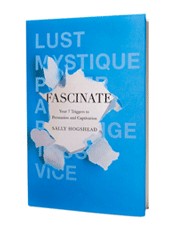 “Fascinate?” you may wonder. In conflicts, people argue, fight, yell, accuse, threaten, push each other’s buttons…but fascinate? That doesn’t seem to fit into our typical paradigm of conflict behaviors.
“Fascinate?” you may wonder. In conflicts, people argue, fight, yell, accuse, threaten, push each other’s buttons…but fascinate? That doesn’t seem to fit into our typical paradigm of conflict behaviors.
Perhaps, it’s time for a mind shift. Triggers are not just those pesky things that we become all worked up about and that send our brains into the fight-or-flight response. According to Sally Hogshead, the author of “Fascinate: Your 7 Triggers to Persuasion and Captivation,” triggers can be fascinating. The triggers that Sally Hogshead identifies can help you grab attention and be more persuasive. They are:
- Power
- Trust
- Mystique
- Prestige
- Alarm
- Rebellion
- Passion
Watch this TEDxAtlanta video in which Sally Hogshead explains how the seven triggers of fascination can help you get others to fall in love with your ideas.
We all have our preferred triggers of fascination that influence our relationships. You can take the F-score test to find out yours at http://sallyhogshead.com/fscoreq1/.
My primary trigger happens to be passion, characterized by “a warm and open style of interaction,” intuitive approach to information and decisions, and probably “a strong creative streak” among other things. “Even when you mask your emotions, you feel passionately about your opinions.” Now I know why I was inspired to write about “Boosting creativity through passion, novelty and pleasure.”
My secondary trigger is rebellion: “A personal sense of freedom is near and dear to your heart; anyone who tries to force you to play by the rules might just end up losing you.”
I wonder how the triggers of fascination play out in conflicts, or more specifically, how we can make a better use of the triggers of fascination to move beyond the predicable sequence of arguing into the state of creative dissonance where we can effectively leverage our differences and open our minds to creative solutions.
Will the passion trigger make me supersensitive and defensive in conflict or will it allow me to show the warmth and empathy needed to break through the impasse? Will my rebellious nature make me less compromising or more resourceful? What makes conflicts fascinating? What do you think?

A great post to open my mind on a cloudy morning!
What makes a conflict fascinating to me is the almost clock-work timing of action/reaction. If one stops to think ahead, we are almost sure to see exactly where each comment or action will eventually take us and perhaps re-think what is going to be said. However, finding the presence of mind to think ahead in the heat of conflict is an ability I am still trying to master.